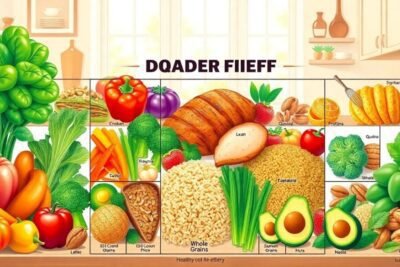
How to lower blood pressure fast after eating too much salt
Excessive sodium intake can significantly impact your blood pressure, especially after meals high in salt. Understanding how to manage this can help maintain your health and well-being.
This article will explore effective methods for quickly lowering your blood pressure after consuming too much salt, providing practical tips and natural remedies.
- What is sodium and its impact on blood pressure?
- How much sodium is too much for your health?
- What are the best foods to reduce sodium levels?
- How can I flush sodium out of my system fast?
- What should I do if I ate too much salt?
- How quickly can reducing salt lower blood pressure?
- What are other ways to manage high blood pressure?
- Questions related to managing sodium and blood pressure
What is sodium and its impact on blood pressure?
Sodium plays a critical role in regulating fluid balance in the body, but excessive sodium consumption can lead to hypertension. When sodium levels are high, the body retains more water, increasing blood volume and subsequently, blood pressure.
Most of the sodium we consume comes from processed foods, rather than from added salt in cooking. This intake can contribute to serious health issues, including heart disease.
According to the American Heart Association, a high-sodium diet can elevate blood pressure levels rapidly and can have long-lasting effects if not managed effectively. Understanding sodium's role is essential for blood pressure management.
How much sodium is too much for your health?
The general recommendation for sodium intake is 2,300 mg per day, but for those with health concerns, the ideal limit is below 1,500 mg. Consuming more than this can lead to increased risks of hypertension and cardiovascular issues.
Many individuals unknowingly consume excessive sodium, primarily through processed and fast foods. Reading nutrition labels is crucial to monitor sodium intake effectively.
- Limit processed foods with high sodium content.
- Choose fresh, whole foods.
- Incorporate herbs and spices instead of salt in cooking.
What are the best foods to reduce sodium levels?
Certain foods can help counteract the effects of sodium and lower blood pressure effectively. Foods rich in potassium are particularly beneficial because they help balance sodium levels in the body.
Consider integrating the following foods into your diet:
- Bananas
- Avocados
- Leafy greens like spinach and kale
- Coconut water
- Potatoes
These foods not only help to reduce sodium levels but also provide essential nutrients that support overall health. Including a variety of these foods can aid in maintaining balanced blood pressure.
How can I flush sodium out of my system fast?
To quickly flush sodium from your body, staying hydrated is crucial. Drinking plenty of water helps to dilute sodium levels and promote its excretion through urine.
In addition to water, consider these quick remedies:
- Drink herbal teas, which can provide hydration and additional benefits.
- Consume potassium-rich foods to promote sodium balance.
- Engage in physical activity to stimulate sweating and increased fluid loss.
Combining these strategies can lead to a more effective reduction in sodium levels, helping you feel better after a high-sodium meal.
What should I do if I ate too much salt?
If you find yourself feeling bloated or experiencing high blood pressure after a salty meal, there are immediate steps you can take. Start by increasing your water intake to help the body eliminate excess sodium.
Incorporate potassium-rich foods into your next meals, such as:
- Sweet potatoes
- Yogurt
- Beans
- Fish
These foods can help balance sodium levels and support your body in managing blood pressure effectively.
How quickly can reducing salt lower blood pressure?
The effects of reducing salt on blood pressure can manifest quickly, often within hours. However, the full benefits may take a few days of consistent low sodium intake to see significant changes.
Many people experience a noticeable drop in their blood pressure when they make a conscious effort to limit sodium. Regularly monitoring your levels can be helpful in understanding how your body responds.
According to health experts, even minor reductions in sodium intake can lead to improvements, making it vital to be mindful of what you consume.
What are other ways to manage high blood pressure?
Aside from managing sodium levels, there are several strategies for effective blood pressure management. Regular exercise, for example, can help keep your heart healthy and reduce hypertension.
Consider implementing these additional lifestyle changes:
- Maintain a healthy weight.
- Limit alcohol consumption.
- Incorporate stress-reducing techniques like meditation or yoga.
- Eat a balanced diet rich in fruits, vegetables, and whole grains.
By combining these strategies with a focus on sodium reduction, you can create a comprehensive approach to managing blood pressure.
How can I flush sodium out of my system fast?
To flush sodium out of your system quickly, hydration is key. Drinking plenty of water can help dilute sodium levels and promote its excretion. Also, consuming potassium-rich foods like bananas and avocados can aid in balancing sodium levels.
Engaging in physical activities such as walking or sweating can help eliminate sodium through perspiration. Each of these actions contributes to a more rapid reduction of sodium in your body.
How do you lower your blood pressure after salty food?
After consuming salty food, start by drinking water to help dilute the sodium. Adopting a potassium-rich diet can also mitigate the effects of sodium. Foods like leafy greens, bananas, and avocados are highly effective.
Physical exercise can further assist in lowering blood pressure by improving circulation and heart health. Implementing these steps can significantly help in maintaining optimal blood pressure levels.
What should I do if I ate too much salt?
If you have consumed too much salt, focus on hydration and dietary adjustments. Increase your water intake and consider eating potassium-rich foods to counteract the sodium. Foods such as sweet potatoes and yogurt are excellent choices.
Additionally, avoid consuming more high-sodium foods for the rest of the day to help your body recover and stabilize blood pressure levels.
How long can a salty meal affect your blood pressure?
The impact of a salty meal on your blood pressure can vary, but typically, it can affect your levels within a few hours. In most cases, the immediate effects can last for a day or two, depending on individual health factors and lifestyle choices.
Understanding how your body reacts to sodium can help you manage your dietary intake more effectively and maintain healthy blood pressure levels.










